
Pregnancy in captivity and childbirth under shelling. How Ukrainian women gave birth in the first year of the war
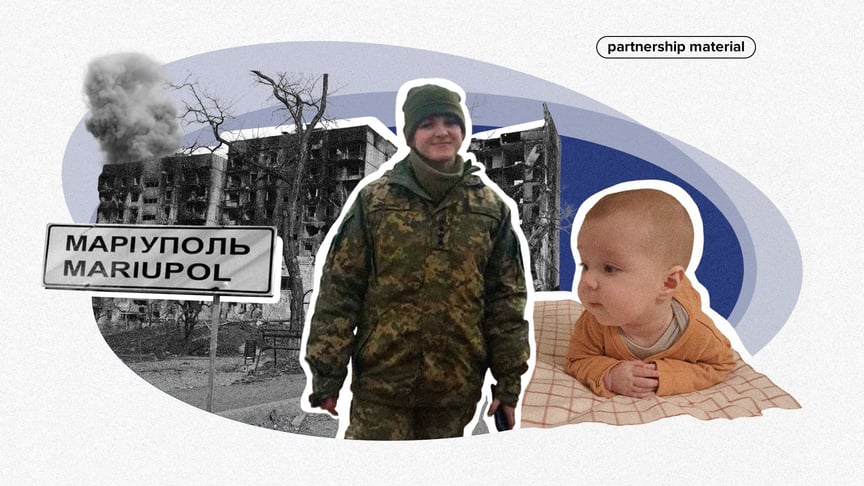
2022 was supposed to be one of the happiest years for combat medic Mariana Mamonova and her husband Vasyl – they were expecting a baby. For the next nine months, Mariana was supposed to visit doctors, take vitamins, rest a lot, and learn the basics of baby care.
But Russia's military plans separated the couple for almost the entire period of pregnancy. The husband got a chance to hug his wife only in the last few days before delivery. Throughout her pregnancy, Mariana had to survive the bombings in besieged Mariupol and captivity in Olenivka prison.
However, it was not easier for pregnant women who met the war in the unoccupied part of Ukraine. They gave birth in basements and in the subway. They were running away from the bombed maternity homes.
Mariana's story and other women's memories of pregnancy during the war are in hromadske's article created with the support of the BGV Charity Fund.
This is no time for myself
No one knew about Mariana's pregnancy for the first three months. Even Mariana herself had barely guessed that she was carrying a child under her heart. She found out about the pregnancy in mid-March when a full-scale war had been raging for almost a month. At that time, five to ten Ukrainian service members from her brigade alone died every day in besieged Mariupol. As the head of the medical service of the military unit, Mariana had no time for herself.
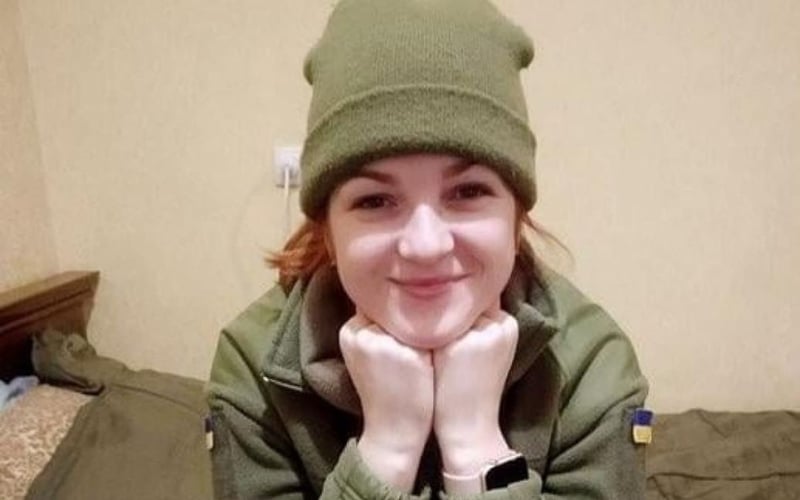
"At first, it seemed to us that they would shoot a little, and everything would be as usual. But when they started shelling us with missiles from the sea, dropping aircraft bombs, and the fire was non-stop, we realized that a big war had begun," Mariana recalls February of last year, exhaling heavily.
She says that back then, she was more worried about the fighters who were in the front positions because the forces were unequal, "We had 300 service members, and there were from 1500 to 500 thousand personnel. The weaponry was also unequal."
So the Ukrainian forces from Shyrokyne (Donetsk Oblast, ed.), where Mamonova was on her fourth rotation since 2018, retreated to Mariupol.
"We lost guys every day. Five, six, ten. It's hard because in four years, I knew everyone who served there. I knew the families of some of them. Someone sent messages to their relatives through me because we had the Internet in the bunker where we lived, and we could at least write, "Your son is alive, everything is fine", "Your husband is alive." And when they sent these messages, I texted their relatives: "Yes, he's alive, he's alive." And the next day, you realize that you can't write anything because he died. And messages from relatives continue to arrive, "My son, are you sure?", "My husband?", "What happened?", "Why don't you write back?". It was difficult to understand that you were late. I didn't save them," says the doctor.
For the entire time at the frontline, the hardest experience for Mariana was the loss of comrades. She says that there were days when she had to help fifteen soldiers in a day, or nine at the same time, but it was not so hard back then because she managed to save everyone.
"But there were moments when you bring a soldier to the hospital alive, and then in only a few hours, you find out that he died. This is difficult to accept. Well, how come? You saved him, but he died... Then you pass this information on to the battalion commander and the unit commander. And you have to tell this to his relatives because the military unit has to call them and tell them about the circumstances of the death of someone's child. This is the hardest," says Mariana.
Two lines
Captivity. She was allowed to make a phone call during one of the interrogations. Mariana and her husband are crying on both sides of the gadget screen. She had just told him she was pregnant. To the first of those who remained on the other side of her reality. She was overwhelmed with emotions as she still shared the news that she had kept to herself for so long.
Her husband froze, his eyes widened. He said, "I'm so happy. Only I didn't want you to tell me this news under such circumstances."
"He was stunned, he said that he guessed, but he wasn't ready to hear it because he realized that he would not help me," the woman says.
She was sure that she was pregnant. One day in Mariupol, Mariana decided to use a pregnancy test hidden just in case. Recently, she felt sleepy, tired and. She thought, "I'll throw it away anyway, why not try it." The test showed two lines. Mariana burst into tears.
"At that moment, I was overcome by panic, hysteria, joy. There was a mix of feelings," Mariana's voice fell silent, expressing all the helplessness of her situation. This is great news for every woman, but I looked at the test and realized that I couldn't share it with anyone. Although I wanted to tell everyone," says the young mother.
Back then, she did not dare to tell about her pregnancy even to her husband. Before she was captured together with other doctors and military from Azovstal, she only managed to send him only a few emojis of two adults with a boy or a girl that hinted at the future child.
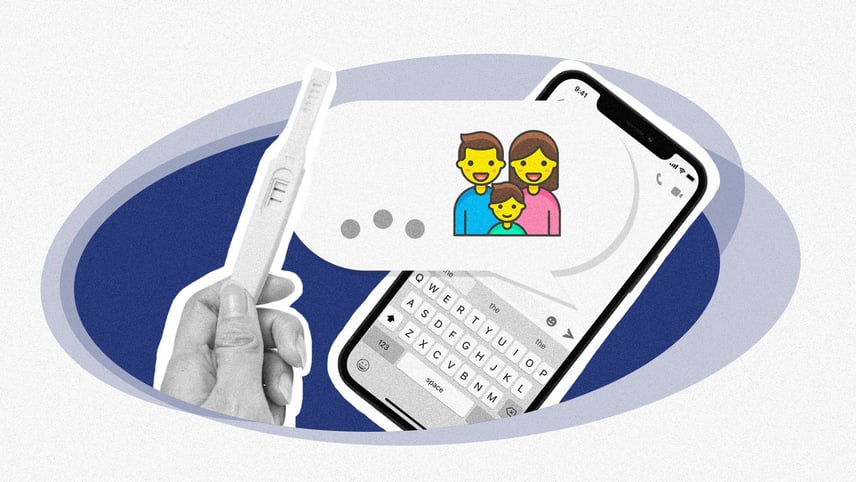
Six months in captivity
"You are pregnant, no one will keep you here," they told her in captivity, so Mariana hoped for a quick exchange. However, the woman spent six months in Olenivka prison.
Mariana lived in the same conditions as other prisoners. There were no exceptions for pregnant. The first two months were the hardest.
"Then the convoy get used to you. And they see that you are no longer as dangerous as everyone says, that Ukrainian women are only snipers, intelligence officers, and killers."
For the first eight weeks in captivity, Mariana, like everyone else, slept on the floor. Mattresses and pillows were provided only in June when the woman was six months pregnant.
"It was a great happiness to move from the floor to a wooden bed that was covered with a mattress. We were so happy," the doctor happily recalls.
Mariana, like everyone else, was interrogated. She says that the interrogation depended on the convoy you've met, "Some were questioned for a very long time, with threats and insults. And there were those who interrogated less, brought food, saying, "We are very sorry for you. We are sorry this happened."
Mariana says that the hardest part in captivity was hearing Ukrainian soldiers being beaten and inability to help them. She was hungry, the pregnant woman wanted to eat all the time.
"On some days they forgot to give us food on time. And the choice was small: they gave porridge and bread for breakfast, borscht à la shchi, a piece of bread and tea at lunch, and the same porridge as in the morning for dinner. And so on, every day."
Cucumbers and tomatoes from the garden, which the prisoners cultivated on the colony's territory, sometimes helped satisfy the hunger. Mariana says that at first female PoWs who were forced to preserve vegetables were stealing for her.
"And then one of the ‘zampolits’ approached me and let me pick these vegetables for myself. I always took more to share with other PoWs."
Anna
Mariana tried to stop sad thoughts about the possible birth of a child in captivity. She really did not want the baby to be born in such conditions because then the baby could simply be taken away from the young mother. However, Mariana didn't believe in returning back home either. A few days before giving birth, when she was put in a car and taken somewhere, she thought she was going to another colony. On a plane, she found out that this was the way home.
During the exchange of PoWs on September 21, Mariana, who was nine months pregnant, was returned to her home along with other doctors and soldiers. The video by the Security Service of Ukraine showing a pregnant woman, who was the first of the 215 PoWs to be on the way home, went viral around the world.
https://www.youtube.com/watch?v=0V1VS8rwItQ&t=30s
Caption: Mariana Mamonova's return from captivity
In a matter of days, on the night of September 25, Mariana gave birth to Anna in the Volyn maternity hospital. The girl was born weighing 3250 grams and growing 57 centimeters.
When Mariana returned from captivity, the first person she wanted to talk to was her husband.
"In captivity, I was constantly repeating that I wanted back to my husband. I want him to take me away. I want to hug him. At that time, he was the closest person to me."
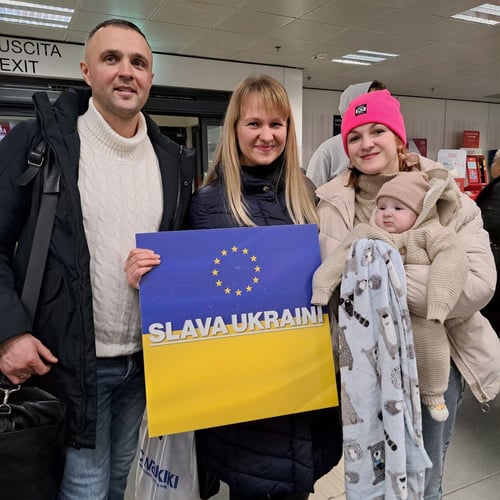
She also dreamed of hugging her relatives: parents, older brother Yura, and sisters Anna and Oksana. Due to the small age difference, only one year, Mariana and her sister Anna were very close. In childhood, they dreamed of becoming doctors.
"We learned to make injections together and used plantago and aloe as a universal cure," says the woman, smiling.
Mariana says that she always wanted to be a doctor, even though no family member had this profession.
Childbirth to the sounds of sirens and missiles
At the beginning of the war, it was also difficult for pregnant women in the territories controlled by Ukraine. Those who reached their due date in the early days of the war were forced to give birth to the sound of air raid sirens in the basements of houses or maternity hospitals, which could be targeted by a Russian missile at any moment.
"When I started to give birth, all the hospital, except me, were taken down to the shelter because of threats of shelling. There was no one, so during the contractions, I was screaming as loud as I could. The doctors returned to me when all the pregnant women were taken down to the basement. In such conditions, I gave birth until eight in the morning," recalls a mother of many children, Anastasia from Cherkasy Oblast.
When the full-scale war began, the woman was eight months pregnant and, together with her husband and two young children, was awaiting the birth of her son Yefrem. After he was born, the family moved to the west of Ukraine.
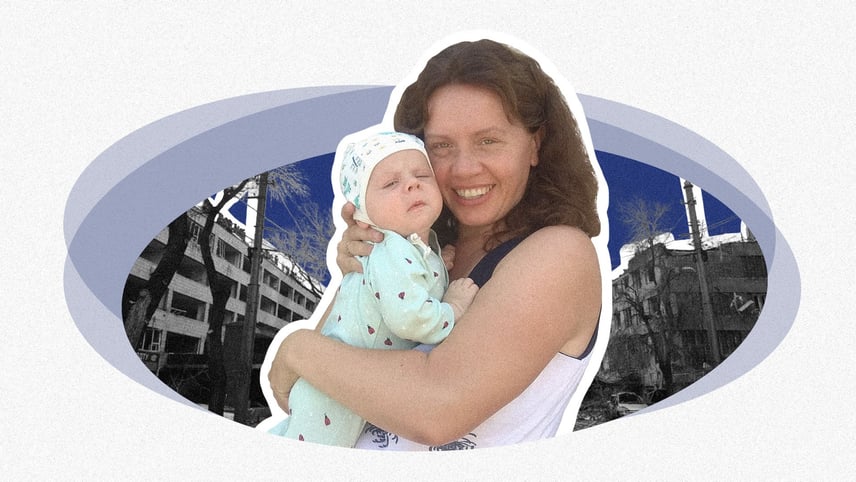
When the full-scale invasion started, Yulia was at home in Bila Tserkva in the Kyiv Oblast. The city was often shelled, so the entire hospital, including patients and equipment, moved to a shelter, where Yulia gave birth a month later.
"It was one big basement with an intensive care unit behind a curtain. Pregnant women lay together. The maternity and prenatal departments were also separated only by curtains. There were no windows, no air. It was humid and very hot. The medical staff tried to take care of us, but it was still a basement," the woman recalls. "I had an emergency cesarean section, and an infection was found in the child during childbirth. She was taken to the children's intensive care unit, which was outside the shelter. I was afraid for my daughter. But there was a day when all the children were brought back with the oxygen cylinders, with all these sensors, and my child was carried right past me. It was unbearable."
Nika, Yulia's daughter, is fine now. A woman and a child live at home and do not want to leave it.
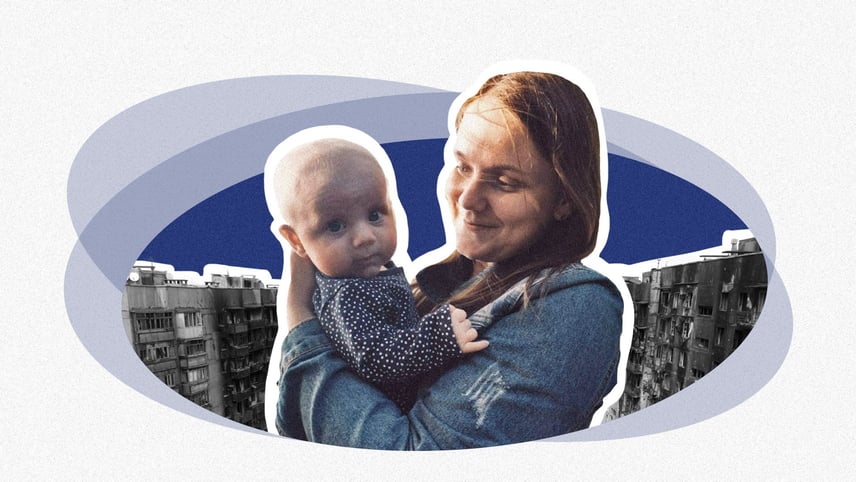
Alice, Anna's daughter from Dnipro, was born with a medical condition that affects the alimentary tract – esophageal atresia. The child needed immediate surgery, which could not be done fast because of the war.
"It was difficult to find a balloon for dilation. In Ukraine, they simply do not exist, and in Europe, they are sold only to medical institutions, so I had to order them from the US. Everything dragged on for long weeks. The surgery was very difficult. It was not easy to recover after it either," says Anna. However, now they are at home with their daughter.
Volunteers for mother and child
After the birth of her daughter, Mariana was surrounded by even greater support. The coverage of her story in the media helped find many well-wishers. People sent clothes and diapers. Mariana says it helped a lot in caring for the baby in the first days and weeks.
Then Mariana also received baby boxes in Ukraine and from the BGV Charity Fund, created by Ukrainian business representatives in March 2022. The young mother says this is enough to take care of the baby until she is six months old. All the women whose stories we mention in the article also received support from the fund.
The volunteers aimed to alleviate the consequences of the war for pregnant, mothers in labor, and mothers with children, by creating and delivering additional baby boxes. Within the three waves of the project, the fund and its partners collected and delivered 30,000 boxes for a total of almost 3 million euros.
The BGV Charity Fund, together with the German initiative #WeAreAllUkrainians, as well as dm-drogerie markt donors, Biosphere Corporation, and logistics partner Nova Poshta, launched the third wave of the project, within which the mother or father of a newborn child from any region of Ukraine (except temporarily occupied territories) can receive a box. There are 10,000 boxes with aid for a total of 1 million euros. The child must be aged between 0 to 2 months at the moment of application submission since the products in the box are intended for this age category. To get a baby box, please fill out a form on the website. There you will also find more detailed information and what is included in the box.
***
Mamonova says that now many women, especially those who have become mothers for the first time, are left alone because their husbands are at war. The woman understands how difficult it can be for them to "just go to the store in the first weeks of caring for a child."
"This need could also be covered by volunteers. So, it would be great if there were more volunteer organizations that focus not only on the needs of the Armed Forces but also on pregnant women and mothers with babies," says Mariana.
Partner material is published as advertising. The project was implemented in cooperation with the BGV Charity Fund. Journalist Lesia Pyniak, editor Victoria Beha, designer Myroslava Mohnatska, translator Tetiana Usova and creative producer Anna Sokha worked on the material.
- Share: